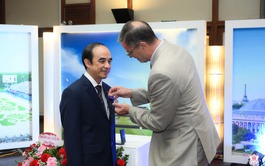
Students receive their degrees at National Economics University in Hanoi. Photo: NEU
Unlike simply teaching English as a foreign language, NEU seeks to make it an officially used language within the university environment.
Dr. Le Anh Duc, head of academic affairs at NEU, explained, "The key is for English to become a tool for thinking, communicating, and managing academic affairs, not merely an output target of language learning.”
Meeting market demands
The urgency of this initiative stems from three main factors.
First, the global labor market increasingly demands high-level foreign language skills, particularly in economics and management.
Second, both faculty and students need to strengthen their capacity for international academic integration through a bilingual academic environment.
Third, NEU’s strategy to become a regional-standard university requires a strong and stable academic language foundation.
NEU is well-positioned to implement the initiative. Since 2012, the university has proactively developed and applied a learning outcome framework for full-time undergraduates.
By 2024, NEU had developed 25 English-taught bachelor’s programs, with plans to expand to 35 between 2025 and 2030, accounting for 65 percent of all academic programs.
Notably, in 2024, about 75 percent of incoming students already met the university’s English proficiency graduation standard upon admission.
However, challenges remain for some students, particularly those enrolled in Vietnamese-taught programs or failing to meet the requirement on schedule.
Systematic, step-by-step implementation
The initiative will be rolled out in three phases:
2025: Conducting surveys, introducing assessment tools, and providing staff training.
2026-27: Piloting the use of English in selected course modules and administrative units, and offering training in specialized language skills.
From 2028 onward: Expanding institution-wide, integrating English into academic procedures, administrative services, charts and forms, and the e-office system.
Clear targets have been set: By 2028, 100 percent of the university's academic programs will have at least 30 percent of modules taught in English, and by 2030, all students must achieve at least a B2 level of English proficiency (equivalent to IELTS 6.0) to graduate.
One notable aspect of the plan is introducing English into administrative documents.
NEU will develop regulations encouraging its use in official paperwork, internal notices, and signage across departments.
The aim is to standardize an internationalized working environment that enables staff to work effectively with foreign partners.
For faculty, the initiative will adopt a tiered and phased approach rather than applying a blanket requirement.
Those with strong English skills will be prioritized for English-Medium Instruction (EMI) training, provided with learning materials, and given reduced teaching loads.
Faculty members with lower proficiency will follow a two- to three-year roadmap that includes specialized vocabulary courses and training in academic presentation skills in English.
To encourage students, NEU will establish 'English Zones' -- areas such as libraries and open spaces dedicated to English communication -- and will organize English forums, clubs, competitions, and industry-specific seminars.
The university will also make AI chatbots and virtual academic assistants available 24/7 to help students practice conversational reflexes, ask questions, and simulate professional scenarios.
In terms of facilities, NEU has built EMI classrooms, language labs, and an English-integrated LMS platform; invested in academic chatbots, AI tutors, and speaking practice systems; and developed a digital library of English-language resources linked to international databases such as ProQuest, Scopus, and ScienceDirect.
According to Dr. Duc, the most critical factor for the initiative success is the determination of the academic staff and a shift in mindset across the institution.
“When English is no longer just a ‘subject’ but becomes a natural part of academic life, we will truly enter the culture of a global university,” Duc added.
Domestic and international experience
In Vietnam, several universities have pioneered the use of English as the medium of instruction and administration, including RMIT University Vietnam, British University Vietnam, and VinUniversity.
Some private institutions implement comprehensive English-language teaching and learning through international partnership models, such as Fulbright University Vietnam, International University under Vietnam National University-Ho Chi Minh City, Vietnamese-German University, and the University of Science and Technology of Hanoi.



Max: 1500 characters
There are no comments yet. Be the first to comment.